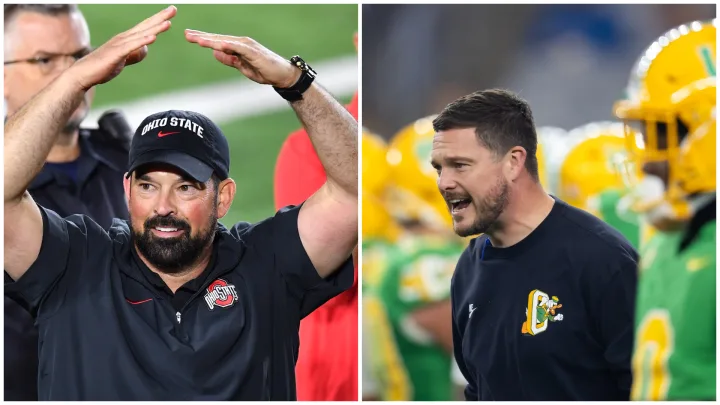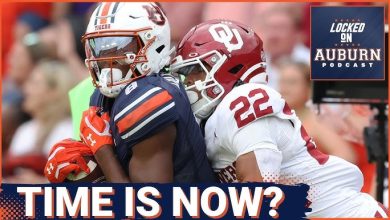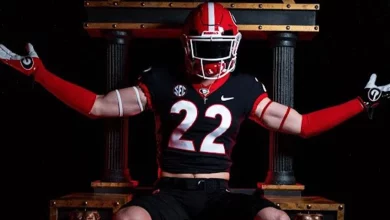Ohio State’s Ryan Day expressed admiration for Oregon’s Dan Lanning, emphasizing his respect for Lanning’s coaching ability, strategic mindset, and the impressive job he’s done leading the Ducks.

In the fiercely competitive world of college football, mutual respect among coaches often serves as a cornerstone for sportsmanship, strategic exchange, and the overall elevation of the game. Recently, Ohio State’s Ryan Day publicly expressed admiration for Oregon’s Dan Lanning, highlighting his respect for Lanning’s coaching ability, strategic mindset, and the impressive job he has done leading the Ducks. This acknowledgment not only reflects the high regard coaches hold for each other but also underscores the significance of leadership, innovation, and integrity in shaping successful programs. To truly appreciate the depth of Day’s commendation, it is essential to analyze both coaches’ backgrounds, philosophies, leadership styles, and how their respective programs embody their visions. This exploration will provide a comprehensive understanding of their impact on college football and the importance of mutual respect among top-tier coaches.
Ryan Day: Ohio State’s Modern Architect of Excellence
Ryan Day took the helm as Ohio State’s head coach in 2019, succeeding the legendary Urban Meyer. Since then, he has maintained the program’s national prominence, guiding the Buckeyes to multiple Big Ten titles and playoff appearances. Day is known for his offensive ingenuity, player development, and calm leadership style. He emphasizes a balanced approach that combines explosive offense with disciplined defense, fostering a culture of accountability and resilience.
Under Day’s leadership, Ohio State has produced numerous NFL-caliber athletes and has consistently been a contender in college football’s elite tier. His coaching philosophy emphasizes adaptability, innovation, and building strong relationships with players and staff. Day’s respect for his peers, especially coaches like Dan Lanning, reflects his recognition of the strategic complexity and dedication required to succeed at the highest levels of college football.
Dan Lanning: Oregon’s Rising Star and Strategic Innovator
Dan Lanning, a relatively young but highly accomplished coach, became Oregon’s head coach in 2022 after serving as Georgia’s defensive coordinator, where he played a pivotal role in securing a national championship. Lanning’s career trajectory illustrates a rapid rise through the coaching ranks, marked by strategic brilliance, adaptability, and a commitment to player development.
Lanning is renowned for his defensive expertise, innovative schemes, and emphasis on building a cohesive team culture. His approach combines modern analytics with aggressive defensive strategies, tailored to exploit opponents’ weaknesses. His transition to Oregon marked a new chapter for the Ducks, where he inherited a program with a rich football tradition and the challenge of competing against Power Five rivals with evolving strategies.
The Significance of Ryan Day’s Admiration for Dan Lanning
When Ryan Day publicly expressed admiration for Dan Lanning, the gesture went beyond mere words; it signified a recognition of shared values, strategic brilliance, and the mutual pursuit of excellence. Such respect among coaches often fosters sportsmanship, encourages strategic exchanges, and elevates the level of competition in college football. It reflects an understanding that coaching is not just about X’s and O’s but also about leadership, innovation, and integrity.
Day’s comments about Lanning’s coaching ability and strategic mindset acknowledge Lanning’s success in rapidly establishing Oregon’s competitive stature. It also underscores the importance of adaptability and innovation in a sport where schemes evolve quickly, and the margin for error is slim. Respect among coaches also serves as a foundation for collaborative growth, sharing best practices, and fostering a collegial environment that benefits players and programs alike.
Analyzing Coaching Philosophies and Leadership Styles
Ryan Day’s Approach
Ryan Day’s coaching philosophy centers on adaptability, player development, and strategic innovation. He emphasizes creating an offense that is dynamic, unpredictable, and tailored to his players’ strengths, often combining a balanced run-pass attack with creative play-calling. His leadership style is characterized by calmness under pressure, transparency, and fostering a culture of accountability.
Day believes in empowering his staff and players, emphasizing the importance of preparation, discipline, and mental toughness. His approach to leadership involves building relationships rooted in trust and respect, which translates into his interactions with players, staff, and peers. He understands that success in college football depends on continuous innovation and maintaining a competitive edge.
Dan Lanning’s Strategy and Leadership
Dan Lanning is recognized for his aggressive defensive schemes, innovative use of analytics, and emphasis on building a resilient team culture. His background as Georgia’s defensive coordinator reflects his strategic acumen—crafting schemes that adapt to opponents’ tendencies and leverage players’ strengths. Lanning’s leadership style combines tactical brilliance with motivational prowess, inspiring his players to buy into a collective vision.
Lanning’s approach to coaching emphasizes discipline, adaptability, and a relentless pursuit of excellence. His teams are known for their toughness, discipline, and strategic flexibility—traits that have helped Oregon compete effectively against traditional powerhouses. His ability to quickly elevate Oregon’s program demonstrates his strategic vision and leadership capacity.
Impact on Their Programs
Both Ryan Day and Dan Lanning have significantly impacted their respective programs, elevating their teams’ competitiveness and national profiles. Day has maintained Ohio State’s status as a perennial playoff contender, emphasizing consistent success, recruiting excellence, and player development.
Lanning, despite being a relatively new head coach, has transformed Oregon into a formidable opponent with a distinctive style—aggressive defense, innovative schemes, and a focus on resilience. His ability to build a cohesive and competitive team in a short period underscores his strategic brilliance and leadership qualities.
Mutual Respect as a Catalyst for Growth
The respect that Ryan Day has shown Dan Lanning exemplifies a broader principle in college football: leadership grounded in mutual admiration fosters a culture of continuous growth and excellence. Such respect encourages coaches to learn from each other, share insights, and push the boundaries of innovation. It also models professionalism for players, emphasizing that competition is rooted in respect and sportsmanship.
This mutual recognition can lead to collaborative opportunities, such as strategic exchanges, joint clinics, or friendly competition that pushes both programs forward. It also sets a standard for players—showing that excellence is achieved not only through hard work but also through respect for opponents and peers.
Strategic Parallels and Differences
While both coaches prioritize strategic innovation, their approaches reflect their backgrounds and team philosophies.
Ryan Day’s Strategy:
- Emphasizes a balanced, explosive offense with creative play-calling.
- Focuses on quarterback development and offensive versatility.
- Values discipline and situational awareness.
Dan Lanning’s Strategy:
- Prioritizes aggressive, versatile defensive schemes.
- Leverages analytics and modern defensive concepts.
- Emphasizes resilience, toughness, and strategic adaptability.
Despite differences, both coaches demonstrate a commitment to innovation, discipline, and player development—hallmarks of successful programs.
Challenges and Future Outlook
Both Day and Lanning face ongoing challenges: maintaining competitiveness amid recruiting pressures, evolving schemes, and the high expectations of their programs’ fan bases. Their mutual respect and recognition of each other’s strengths can foster a collaborative mindset, encouraging continuous innovation and resilience.
As college football continues to evolve with technological advances, transfer portal dynamics, and NIL opportunities, leadership qualities like those exhibited by Day and Lanning will be crucial. Their example underscores the importance of strategic adaptability, integrity, and mutual respect in navigating the sport’s complexities.
Broader Significance of Respect Among Coaches
The recognition between Ryan Day and Dan Lanning exemplifies a broader cultural value in college football: that competition should be rooted in respect, sportsmanship, and a shared pursuit of excellence. Such attitudes elevate the sport, foster positive relationships, and set a standard for players and fans alike.
Moreover, mutual respect among coaches encourages a healthy competitive environment where innovation thrives, and programs push each other to new heights. It also demonstrates leadership qualities that transcend winning—highlighting integrity, humility, and the importance of collaboration.
Ryan Day’s admiration for Dan Lanning encapsulates the essence of leadership in college football: recognizing excellence in peers, valuing strategic innovation, and fostering a culture of mutual respect. Both coaches exemplify the qualities necessary to succeed at the highest levels—strategic brilliance, resilience, integrity, and a commitment to continuous growth. Their relationship serves as a model for aspiring coaches and players, emphasizing that greatness is achieved not only through talent and hard work but also through respect, collaboration, and shared pursuit of excellence. As college football continues to evolve, the respect between leaders like Day and Lanning will remain vital in shaping a sport that values integrity, innovation, and the relentless pursuit of greatness.









